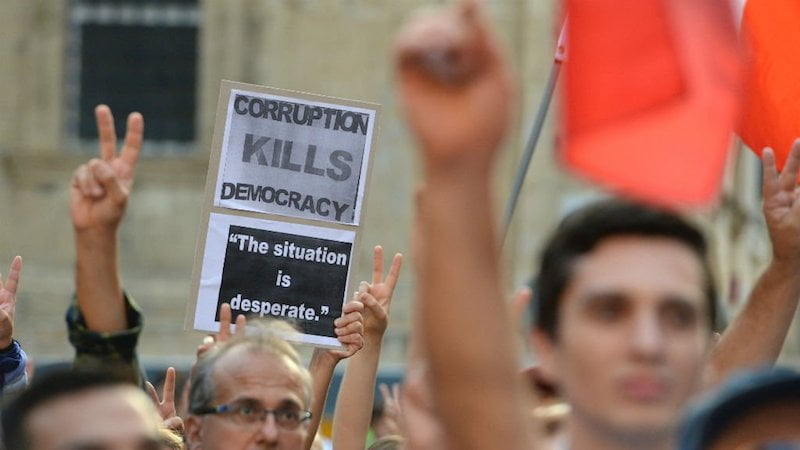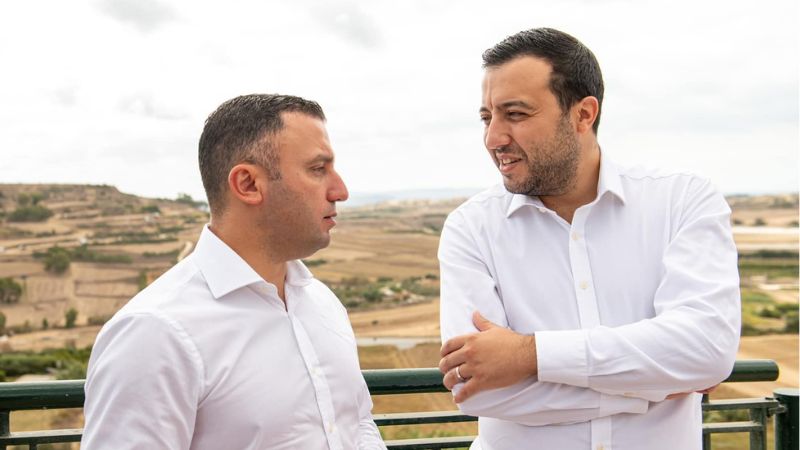The Maltese government has signed a United Nations declaration promising to “investigate, prosecute, and punish threats and acts of violence” against journalists, provide a “Safe and enabling environment” for whistleblowers, and ‘take effective measures” to “prevent, investigate, and prosecute” corruption involving public officials.
The declaration on “challenges and measures to prevent and combat corruption and strengthen international cooperation” was signed yesterday at the first-ever UN General Assembly Special Session against Corruption, which started yesterday and will close on Saturday.
A spokesperson for the UN confirmed to The Shift that “the document was adopted by consensus, meaning that all have supported it, including Malta.”
Malta’s problems with corruption across government and state-run enterprises have multiplied over the last few years. Transparency International earlier this year published its corruption perception index showing Malta had dropped even further, to reach its worst-ever result. Scoring 53 out of a possible 100, it has lost seven points since 2015. TI highlighted the country as one of only 22 that had “significantly” worsened their score during 2020.
As well, a Eurobarometer survey published at the start of the year showed that almost 90% of the population thought corruption was “widespread”. This is a growth of 10 points in two years.
With this move, however, Malta has undertaken to uphold the declaration that “we”, i.e. member states, heads of government, ministers and representatives are “concerned about the seriousness of the problems and threats posed by corruption”, to societies, institutions, the values of democracy and ethics, justice, and the rule of law.
The signatories, including Malta, then pledge to “pursue a multilateral approach in preventing and combatting corruption” and reaffirm commitment to the UN Convention on Corruption, to which Malta is also a signatory. It also mentions that these measures must be integrated into each state’s legal system as necessary.
Malta also promises to prevent and combat corruption with both regard and respect for all human rights, democracy, and human rights at all levels. By signing the document, they have also recognised the “injustice and other negative consequences caused by corruption” while reaffirming their “commitment to ending impunity for corruption offences.
Malta commits to full raft of anti-corruption pledges
Amongst a total of 87 commitments, the Maltese government has pledged to step up efforts in seizing assets linked to financial crime, to better implementing anti-corruption obligations, and to grant independence to national corruption-fighting bodies.
In terms of the latter:
“We recognise the role of anti-corruption bodies and specialized authorities in implementing and monitoring these policies and practices, and we will grant them the necessary independence, by the fundamental principles of domestic law, to enable them to carry out their functions effectively and free from any undue influence and with integrity and accountability.”
They also note the importance of the role played by the supreme audit institutions, and commit to “fostering a culture of accountability, transparency, legality, integrity, and fairness in the public sector.” This includes ensuring all public officials adhere to anti-corruption obligations, conflict of interest prevention measures, and ethical standards.
The authorities also commit to understanding the importance of an “independent and transparent judicial system” that is in line with judicial ethics and integrity.
Furthermore, they promise to increase both transparency and accountability in the management of public finances, in procurement, funding, contracting, and throughout the whole procurement cycle.
Duty to protect journalists and the free press
Concerning the media, Malta has bound itself to “provide a safe and adequate environment to journalists and we will investigate, prosecute, and punish threats and acts of violence, falling within our jurisdiction, committed against them.”
They have also signed on the dotted line, noting their appreciation for the important role civil society, academia, and the media play in identifying and reporting on cases of corruption.
“We will respect, promote and protect the freedom to seek, receive, publish and disseminate information concerning corruption and ensure that the public has effective access to information, in accordance with the domestic laws,” the declaration adds.
The Maltese government’s signature on the document means it declares that it rejects “corruption and will implement measures to better detect it with a view to ending impunity. We commit to criminalizing, investigating, prosecuting, and adjudicating acts of corruption and related offenses in the public and private sectors. We commit to having in place and enforcing effective, proportionate, dissuasive, and non-discriminatory criminal or non-criminal sanctions against natural and legal persons for corruption and related offenses.”
Malta’s political and judicial systems pose risk to journalists: RSF
In terms of media freedom, Malta has fallen from 45th out of 180 countries in 2013 to 81st out of 180 in 2020. Its media climate has been described as remaining a “cause for serious concern”, due in part to the still unsolved assassination of journalist Daphne Caruana Galizia.
Almost four years after her murder, a slow and sluggish court process is yet to yield any convictions.
It’s also worth noting that the government resisted an independent inquiry into the assassination and the circumstances that led to it, despite significant international and local pressure. They finally agreed in 2020 but again, proceedings remain slow.
RSF describes the country as suffering from a “political system that continues to muzzle press freedom, discrimination in accessing information, and an inefficient judicial process” as posing a risk to journalists.
Unresolved corruption scandal still weighing Malta down
Most recently, the Council of Europe’s Group of States Against Corruption (GRECO) reported that the draft code of ethics for Maltese MPs was still lacking. It doesn’t contain any provisions for sanctions or enforcement in the case of violations. So far, it’s only managed to address four of the nine Council of Europe recommendations on the matter.
Malta is also struggling to combat human trafficking, money laundering, financial crime, iGaming scandals, tax evasion, mafia links, and cash-for-passport issues. This is in addition to the ongoing scandals such as Electrogas, Vitals Global Healthcare and the Montenegro windfarm, among many others.













Not surprising in the least. Hoodlums in government.
And the political-anti-hero charade they have always fooled voters with is telling. Only a psychopath could create that.
‘ The declaration on “challenges and measures to prevent and combat corruption and strengthen international cooperation ‘
Does this statement apply to the disgraced joseph muscat, konrad mizzi and all other around Kastilja ?
The pledges should be incorporated in the constitution.
So maybe the Labour Party-State is planning to scrap all the deals it signed about the gas power station, the public hospitals, and the World’s Most Expensive Kitchen, among others, and to bring to justice all those Labour politicians who had any thing to do with those contracts.
But I rather think that since the signing was unanimous, they had no option but to sign the declarations, only because otherwise they would have been the only ones to refuse to sign.
Dal dire al fare, c’e in mezzo un grande mare.
Can I ask the President of Malta to make all the members of Parliament and every candidate contesting the elections, sign this declaration with the authentication of a notary appointed by him?